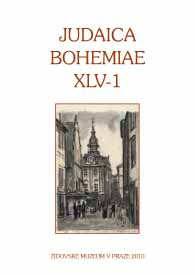The Jewish World Relief Conference in Carlsbad, 1920 and 1924. A Struggle for European Jewish Self Determination
The Jewish World Relief Conference in Carlsbad, 1920 and 1924. A Struggle for European Jewish Self Determination
Author(s): Dieter J. HechtSubject(s): Jewish studies
Published by: Židovské Muzeum v Praze
Summary/Abstract: Carlsbad (Karlovy Vary), together with its sister towns Marienbad (Mariánské Láznì) and Franzensbad (Františkovy Láznì) served as spa resorts for summer vacations, and at this time of year transformed into Jewish metropolises at the end of the 19th century. Almost every year thousands of Jewish families from all religious denominations, and from different social as well as cultural backgrounds came to these towns in order to meet, do business and relax. Carlsbad became the most illustrious of the three towns. The geographical location, as a spa in central Europe, made the city highly popular. Even the Orient-Express Ostende-Vienna/Istanbul stopped at the city every day during the summer months. At the crossroads betweenWestern and Eastern Europe the Bohemian spa resort made their visitors feel at home and far away at the same time. Every summer in the early 1920s, meetings of Jewish organizations took place, e.g. in August 1920, the Jewish World Relief Conference (Jüdische Welthilfskonferenz), in September 1921 and August 1923, the Zionist World Congress and in August 1924 again the Jewish World Relief Conference (JWRC). In the late 1920s and early 1930s this conference tradition was kept alive by various international Jewish organizations, which held their meetings in Banská Bystrica, Brno, Ostrava and Prague. There are several reasons Carlsbad was chosen as a Jewish meeting place. Aside from the fortunate geographic location, the relatively stable political situation and a well functioning democracy was certainly a further advantage. Even more, the engagement of President Tomáš Garrigue Masaryk (1850–1937) in the ‘blood libel’ trial against Leopold Hilsner (1876–1928) and his reputation as supporter of Jewish interests added to the status of Carlsbad. Additionally, the recognition of ‘Jewish nationality’ in a law completing the Czechoslovak constitution in February 1920 likely increased the attraction of the Czechoslovak Republic for Jewish-national organizations. But in Carlsbad, a city with a German speaking majority, the attitude towards Jews was ambiguous. During the summer, Jewish visitors and congress delegates were welcomed (but even then some hotels rejected Jewish guests); in winter, the Jewish community suffered from harsh anti-Semitism. This hypocritical behaviour indicates widespread anti-Semitism in the Czechoslovak Republic that was reflected by anti-Semitic agitation in the Czech press and even more by pogroms throughout the country in November 1918.5 Anti-Semitic views could even be found in the political establishment, even in Masaryk’s own attitude towards Jews, as noted by Hillel Kieval. Masaryk’s favourable stance toward Zionism and Jewish-national politics accommodated his own political aims to weaken the national rivals of the Czechs and Slovaks.
Journal: Judaica Bohemiae
- Issue Year: XLV/2010
- Issue No: 1
- Page Range: 51-69
- Page Count: 19
- Language: English
- Content File-PDF

